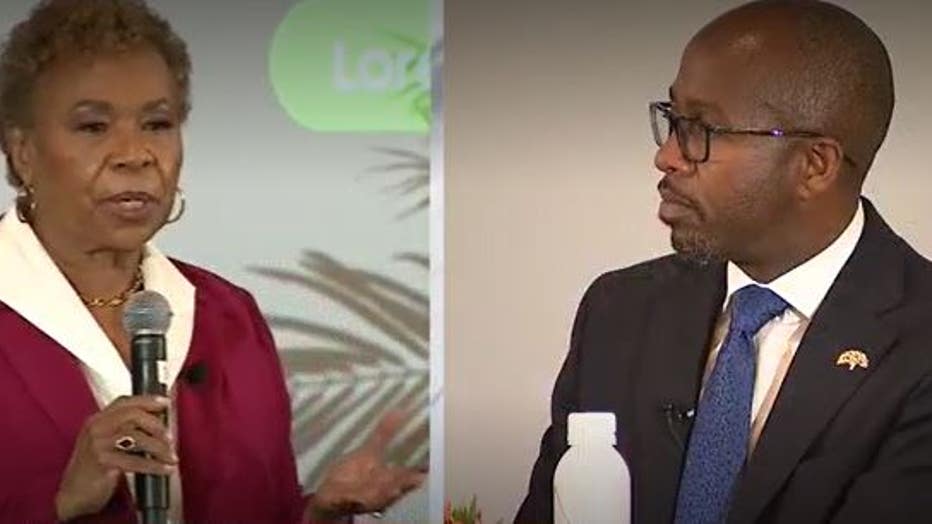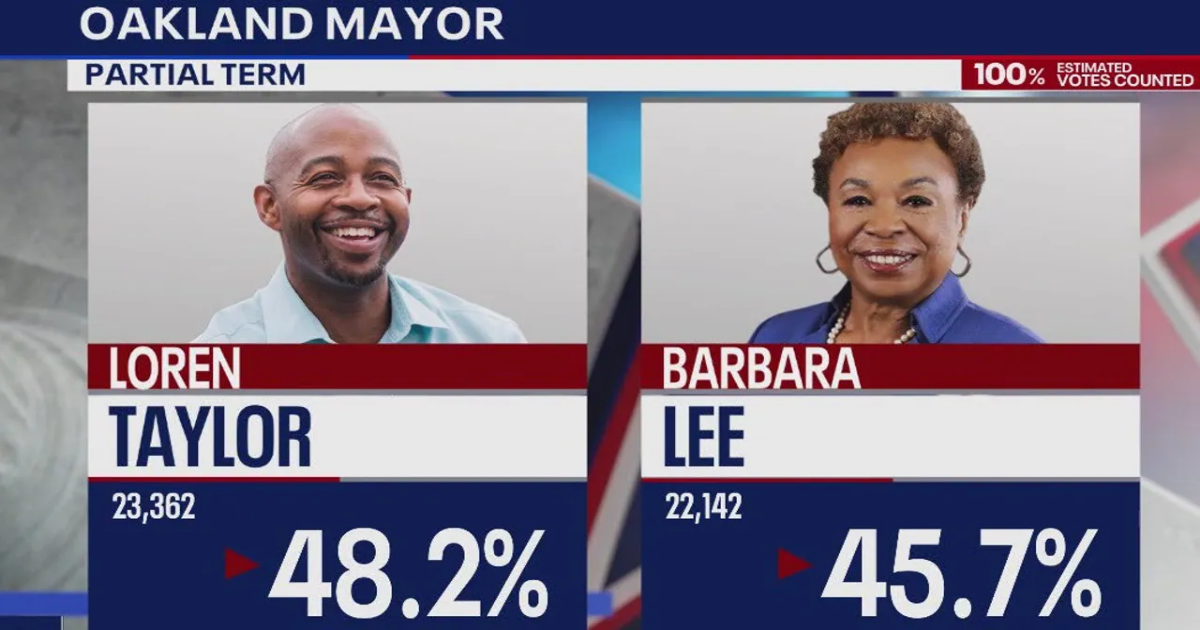OAKLAND, Calif. – Loren Taylor was leading in early returns in the special election to select Oakland’s next mayor Tuesday night, according to the Alameda County Registrar of Voters’ Office.
Taylor was ahead of the nine other candidates on the ballot with nearly 49 percent of the vote in the first round of ranked-choice voting as of about 8:15 p.m.
Former U.S. Rep. Barbara Lee was in second place with about 45 percent of the vote.
All of the other candidates had less than 2 percent of the vote each.
The results are preliminary and the final vote tally will be announced after the Registrar of Voters Office completes several rounds of ranked-choice vote counting.
Next update is Friday
It could take several days for the final tally to come in and the next scheduled update isn’t until Friday, according to the registrar’s website.

Election night excitement
Speaking from his downtown Oakland watch party, Taylor said his early lead was indicative of the need for change. He said voters were not standing for business as usual. While he called Lee, his opponent, a political icon, he also said she’s someone who’s been in the political establishment for 50-plus years.
“We knew that Oaklanders were hungry for change, hungry for something new that would solve the problems and not just see those same problems reoccur time and time again,” said Taylor. “It’s great to have the lead but we have been here before.”
His tone was one of overall excitement. He reiterated that public safety was his overall priority. Taylor said he looks forward to sitting down with the current chief of police in Oakland to see what solutions they can come up with.
Taylor said he wants to see Oakland gain traction on a different trajectory than the negative portrayal it has seen in recent years.
Meanwhile, at her watch party, also in downtown Oakland, Lee had just wrapped up speaking with her supporters when KTVU caught up with her. Despite the fact that she was trailing, the former congresswoman remained full of excitement.
She said the beauty of Oakland needs to be remembered, highlighted and honored. She spoke of an action-packed timeline on a compressed campaign trail in the last two months.
“If I am so fortunate as to be the mayor, we can pull this city together with people with different points of views living in different parts of the city to really find common ground to move this city forward,” Lee said.
Lee said she looks forward to governing with allies and partnerships.
The backstory:
The election was scheduled after former mayor Sheng Thao lost a recall election in November.
Lee, who served as the city’s U.S. congressional representative from 1998 to 2025, and Taylor, a former city councilmember and founder of the well-connected political advocacy organization Empower Oakland.
Taylor previously ran for mayor against Thao in 2022 and narrowly lost the election to her by less than 700 votes after nine rounds of ranked-choice voting.
A third-generation Oaklander, Taylor has a master’s degree in biomedical engineering from the University of Connecticut and a master of business administration degree from University of California at Berkeley’s Haas School of Business.
In addition to her career in Congress, Lee also served in the California State Assembly for six years and the state Senate for two. She earned an undergraduate degree from Mills College in Oakland and a master’s degree in social work from UC Berkeley.
The other candidates on the ballot include President Donald Trump enthusiast Mindy Pechenuk and frequent entrant Peter Liu, former Olympian/comedian and barista Elizabeth Swaney, former Thao advisor Renia Webb, Bay Area Council vice president Suz Robinson, a woman named President Cristina Grappo — who describes herself as a “provider” on her official ballot designation, paralegal Tyron Jordan, who said he suspended his campaign to support Lee, and union factory worker Eric Simpson.
Featured
Oakland voters will make their voices heard in the special election on Tuesday. The two leading candidates met with voters on the eve of the election as they made their final pitches.
Oakland City Council – District 2
Early lead for Wang :
Charlene Wang was leading in early returns in the special election to select Oakland’s next District 2 city councilmember Tuesday night, according to the Alameda County Registrar of Voters’ Office.
Wang was ahead of the five other candidates on the ballot with about 52 percent of the vote in the first round of ranked-choice voting contest as of about 8:15 p.m.
Kara Murray-Badal was in second place with about 24 percent of the vote and Harold Lowe III had about 13 percent.
The results are preliminary and the final vote tally will be announced after the Registrar of Voters’ Office completes several rounds of ranked-choice vote counting.
It could take several days for the final tally to come in and the next scheduled update isn’t until Friday, according to the registrar’s website.
The election was scheduled last year following the election of the former District 2 councilmember Nikki Fortunato Bas to the Alameda County Board of Supervisors last November.
The winner of Tuesday’s election will represent an area that is roughly east of Lake Merritt and south of Piedmont.
The other candidates are property manager Paula Thomas, the Rev. Kenneth Anderson, restaurateur and local businessperson Kanitha Matoury, housing policy advocate Murray-Badal and financial planner Lowe III.
Featured
The ballot includes nine candidates for Oakland mayor, but the two front-runners are former U.S. Rep. Barbara Lee and former city council member Loren Taylor.
Candidates in the race
Wang is an East Bay native who grew up visiting her grandparents in West Oakland and who now lives in the Eastlake/San Antonio area.
She has worked for the U.S. EPA on civil rights and environmental justice issues. Wang lost a November 2024 election for the at-large City Council seat to current Councilmember Rowena Brown.
Murray-Badal, an Oakland native, is the director of the Housing Venture Lab, a housing policy and advocacy organization. She earned a bachelor’s degree from Stanford University and graduate degrees from University of Pennsylvania’s Wharton School and Harvard Kennedy School.
Matoury is a first-generation Cambodian immigrant and long-time owner of the now-closed Spice Monkey restaurant and current owner of Howden Market. She also ran in and lost the at-large City Council election to Brown.
Another Oakland native, Thomas, says on her website that she created a hip hop radio station in Sacramento then bought an AM talk-format station after graduating from San Francisco State University with a undergraduate degree in communications.
She says she decided to run for the council seat after becoming concerned with crime and, if elected, will work to create afterschool programs for kids and on reducing gun violence.
Lowe, born in Oakland’s Highland Hospital, lost to Fortunato Bas in the 2022 District 2 election. He earned an undergraduate degree from the University of California at Berkeley and a master’s degree in public administration from California State University, East Bay.
Anderson is pastor of Williams Chapel Baptist Church in Oakland. He says he is running to improve housing stability, public safety and support for Oakland’s churches and businesses, among other things.
Measure A – Half-cent sales tax
Oakland’s Measure A, a half-cent sales tax proposal, was ahead in early returns Tuesday night with about 64 percent of voters approving it, according to information from the Alameda County Registrar of Voters’ Office.
If approved, it would increase Oakland’s sales tax from 10.25 percent to 10.75 percent to raise between $20 million and $30 million annually for the next 10 years.
It requires a majority of votes — greater than 50 percent — to pass.
The Oakland City Council voted 6-0 to place the measure on the ballot in December 2024, with then-councilmember Carroll Fife and Councilmember Janani Ramachandran excused.
The tax “will help stabilize our finances and prevent further erosion in city services, so without the added revenue Oakland will be forced to do deeper cuts that threaten critical community programs such as public safety, cultural arts, human services and undermining the city’s quality of life and economic vitality,” said Councilmember Kevin Jenkins at the time.
Jenkins, who sponsored the ordinance to place Measure A on the ballot, is now serving as interim mayor until the winner of Tuesday’s mayoral election begins their term.
Measure A is intended to help tackle Oakland’s ongoing budget shortfall, which is estimated at $280 million over the next two-year budget cycle.
KTVU’s Amber Lee and Greg Lee contributed to this report.
OaklandCalifornia PoliticsNewsSheng Thao





